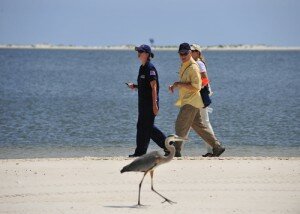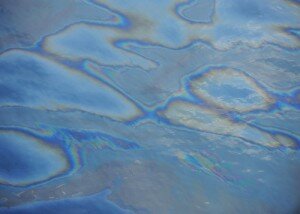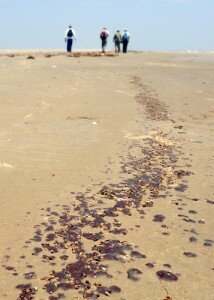[Ed. note: This article is part of our series of weekly church activities, Cultivating Community, published on Thursdays]
The Exxon Valdez oil spill of 1989 thrust creation’s vulnerability into the spotlight for many of us for the first time. Yet, over 20 years later, that vulnerability shocks us again as we witness the unfolding of what could be our country’s most serious environmental disaster and a significant economic wound for an already fragile region.
On April 20, when an explosion occurred at the British Petroleum-operated oil rig Deepwater Horizon in the Gulf of Mexico, 11 workers were killed and a Pandora’s box of pollution burst open. About 5,000 barrels (about 200,000 gallons) of oil per day have been pouring from the ocean floor, and efforts to stem the gusher have failed. Experts, who are just beginning to witness the seeping of crude oil into the delicate ecosystems surrounding the Gulf, can say little about the environmental impact of the spill, other than to emphasize its enormity.
In an interview with Flourish, Aaron Viles, campaign director for the Gulf Restoration Network in New Orleans, said that dealing with the repercussions of the spill will take more than a year, at the least. In the meantime, what can we do as church communities called to stewardship?
Learn
In order to pray authentically and act appropriately in the face of disaster, we must first understand and be able to share the story of it with others. Praying together as communities, providing information and resources on church websites and in bulletins, and taking part in some of the activities below will raise awareness not only about this tragedy but about our stewardship responsibility in general.
Background - The oil spill is actually a leak of crude oil from undersea wells. It started after a fire and explosion sunk the Deepwater Horizon rig, and attempts to seal or contain it have failed. The latest plan British Petroleum has for stemming the flow of oil is a risky maneuver that might seal the well, but might also cause the oil to gush at a faster rate if it fails. In the meantime, although chemical dispersants have been applied to condense and sink the oil and containment booms have been placed around some sensitive shoreline areas, oil slicks are approaching the shores surrounding the spill site and have already claimed or threatened the lives of sea turtles and birds. BP has told Congress that the wells could potentially spill up to 60,000 barrels of oil a day.
Environmental Impact - Although it is impossible to say what the extent of the oil spill’s impact will be on the areas vulnerable to damage, we do know a lot about the ecosystems that will be affected and the species that are in harm’s way.
- Already, untold damage is being done to fish and other marine wildlife struggling through oily water. A pod of endangered sperm whales gathers in the area directly affected by leaking oil, blue fin tuna are spawning in the area at exactly this time of year, and sea turtles that have swum through the slick have already washed up, dead, onto nearby shores.
- Migratory landbirds that will be looking to refuel in the region’s wetlands after long flights over the Gulf of Mexico will find their resting spots drastically altered. Other birds have already begun nesting on the shores of the Gulf. These species will rely on fish–now polluted–to feed themselves and their young. The Audubon Society has created a list of bird species that are threatened by the oil spill, and it explains how the environmental destruction might harm them.
- The ecologically important Mississippi River Delta (comprising 40% of the salt marsh of the contiguous United States), wetlands, and sandy beach environments that run along the Gulf Coast from Louisiana to Florida are all threatened by the oil that has begun to reach them. All of these ecosystems are incredibly productive and diverse but also fragile. The wetlands of the Delta, for instance, are already endangered and being lost at a rapid rate. Re-establishing them after any destruction is a long process.
Economic Impact - In a region still recovering from Hurricane Katrina, those who harvest shrimp, crabs, oysters, and other marine species for a living are bracing for the impact of the oil spill on their livelihoods. Fishing regions east of the mouth of the Mississippi River have been closed since the oil spill started, and some people, prohibited from fishing by safety precautions, are already turning to public aid and charity to get by. Effects of the spill are dependent on the trajectory of winds and the amount of oil–and the chemicals used to disperse the oil–that will show up in prime fishing areas.
Pray
“… if my people, who are called by my name, will humble themselves and pray and seek my face and turn from their wicked ways, then I will hear from heaven and will forgive their sin and will heal their land.” – 2 Chronicles 7:14
Soon after the enormity of the Gulf Coast oil spill became clear, Ed Brown, director of Care of Creation, wrote a piece titled “How Do You Pray About an Oil Spill?” In it he encouraged Christians to pray prayers of confession over the arrogant and naive use of the natural resources allotted to us. He writes, “If we are to pray over this situation, we need to be very clear about one thing: This is not an act of God. We have done this to ourselves. This does not mean we cannot pray–it actually means the opposite. We will find no solution unless we do pray.”
An injunction to similar prayers of confession, repentance, and humility comes from God in 2 Chronicles 7:14. God’s healing
of the land follows a turn of humility and repentance from his people. It is interwoven with God’s attention and forgiveness–a holistic act that is not isolated to spiritual cleansing or physical restoration but contains both.
So as Christians, our first response to disaster, after educating ourselves about it, is to lift those impacted (people, wildlife, ecosystems, etc.) to the One whose promises to heal we trust, but to do so with full knowledge and grief over our own complicity in the horrors others are experiencing.
Our friends at Creation Hope have established a website, called Oil Spill Prayer, to provide encouragement and accountability for the prayers of God’s church in the wake of this disaster. Visit this website, encourage others in your community to visit it, and lift up your own prayers with other Christian brothers and sisters who are doing the same for the Gulf Coast. Consider lifting the Gulf of Mexico, the inhabitants along its shores, and the wildlife that depend upon it in your prayers during a small group, Sunday school, or church service.
Give
According to Aaron Viles, environmental organizations working to contain the effects of the oil spill are “not urging people to come down and scrub an otter or a bird.” For now, organizations are looking to build their capacity to address the spill with additional funding. Below we offer several suggestions for raising money as a church community, and provide you with links to local, reliable organizations where those funds will be responsibly used.
Raise Money - In the wake of the earthquake in Haiti earlier this year, we provided a guide to honoring Haitian tradition and helping the country rebuild by hosting a “Soup Joumou” fundraising dinner at your church. You can initiate similarly creative events to raise money for the Gulf Coast clean up. A shrimp po’ boy fundraising dinner or night of jazz or blues music can elicit some talent from your congregation and some resources for the oil spill clean up.
Make an Offering - Like committing to pay a little extra for Fair Trade coffee or designating money for Haiti’s rebuilding, taking a gift or compassion offering for the Gulf region is a ministry of sacrifice and generosity. A collection of this sort may need to be preceded by an explanation of the oil spill disaster and the importance of healthy Gulf ecosystems to God’s creatures and people. Then, with prayer for the affected region and thanks for our resources, we can give gladly to the efforts of organizations that might not expect Christians to support environmental work, but that will be surprised and blessed by the generosity of God’s people.
Take a Tour - The Gulf Coast Fund for Community Renewal and Ecological Health, a grant-making institution supporting community-led and grassroots initiatives for social and environmental flourishing along the Gulf Coast, is hosting a Gulf Coast Fund Funders Tour to educate grant-makers, foundation trustees, and donors about the situation in the Gulf. Tour guests will:
- Visit sites across the Gulf Coast impacted by the disaster to understand the disaster first-hand;
- Meet with oystermen, shrimpers, and local fisherpeople and explore impacts to local economies and food systems;
- Hear from environmental networks working in the Gulf and coordinating with national and international partners;
- Meet with community leaders on the front lines of the disaster;
- Hear from scientists about immediate and long term health and ecological impacts and options to address them.
Where to Give – While national organizations such as the National Wildlife Fund and the Audubon Society have resources and influence to benefit the ecosystems suffering from the oil spill, they also have a diverse agenda of environmental concerns to attend to, so their help in the Gulf Coast, however important, will be fleeting compared with the attentiveness local organizations can provide in such situations. Here are links to those organizations that have been, and will be, working for the Gulf Coast’s health for some time, as well as some of the national organizations that have local chapters along the Gulf Coast:
- Gulf Restoration Network – The GRN provides technical support and mentoring to grassroots groups, connects members to developments on issues of importance to their work, and provides coordination, of member activities across the region. It also pursues campaigns on priority issues affecting the Gulf region.
- Gulf Coast Fund for Community Renewal and Ecological Health – A grant-making instituion that, for this disaster, is providing community-led environmental networks in the area with resources to assess the local environmental and social impact of the oil spill.
- Our Gulf Waterkeepers – This collection of local organizations–all members of the national Waterkeeper Alliance–are serving on the front lines of the Gulf Coast oil spill disaster.
- Audubon Society – With chapters along the Gulf Coast, the Audubon Society is making sure rescued birds are relocated to appropriate habitats and organizing volunteers to participate in clean up and wildlife rescue.
- National Wildlife Federation – The NWF has established a simple way to donate via texts: Text “Wildlife” to 20222 to donate $10 to the organization’s oil spill clean up efforts. A team of wildlife experts from the NWF is on the Gulf Coast assessing the damage and determining the best response.
Act

Wildlife like herons are dependent on the good graces of human volunteers in this situation. (Image courtesy US Coast Guard)
Although it is not appropriate to fly down to the Gulf Coast, pick up an oil-slicked bird, and start scrubbing on your own, there are lots of opportunities to assist established organizations with oil spill clean up efforts at ground zero. Here is a list of those opportunities, and also some things you can do to help from home:
On the Ground - A number of organizations are recruiting volunteers to help out with immediate efforts in the areas impacted by the oil spill. The links provided here will bring you directly to the volunteer opportunities provided by these organizations. Please note that experience relevant to oil spill clean up and skills associated with wildlife observation and handling are in particularly high demand. But there is also a need for folks to take photographs, tend databases, and staff phone banks, so check out these opportunities and see where you might fit in:
- National Wildlife Foundation Gulf Coast Surveillance Teams – Volunteers are needed to track and report on the impacts of the oil spill, support the wildlife rescue and rehabilitation effort, and restore delicate coastal ecosystems in the Gulf of Mexico.
- Audubon Society – One of the more detailed volunteer registration forms available, which may helpful in determining where you can plug in.
- Coalition to Restore Coastal Louisiana – This aggregate of organizations is just asking volunteers to register at this point, with the understanding that they will be contacted when appropriate opportunities emerge.
- Gulf Coast Fund – This page on the GCF’s website is a hub where you can find volunteer opportunities in the general region and also on a state-by-state basis.
In the Area - If you live along the Gulf Coast, or will be visiting Gulf Coast beaches sometime soon, you can take part in ongoing conservation and monitoring efforts as an ordinary citizen.
- eBird – Since the oil spill, birding has become a crucial tracking method that is fundamental to monitoring the health and size of bird populations along the Gulf Coast. The online birding resource eBird is encouraging birders to pay close attention to the species they spot in Gulf-area marshes and beaches, and to record their observations on eBird’s site: “If the oil does make landfall, we’ll have recent data from all around the Gulf to help prioritize and focus conservation efforts. As time goes on, continued beach surveys will help conservationists assess the impacts of the spill.”
- · If you live along the Gulf of Mexico and find oil-slicked wildlife, do not attempt to clean up or rescue it on your own, as doing so could pose a threat to your health and that the injured animal. Instead, contact BP’s oiled wildlife hotline: (866) 557-1401
Near and Far - If you live as far away from the spill as Hawaii or Minnesota, don’t worry–you can still help from home! A number of organizations have crafted letters petitioning the government for resources to be allotted to the Gulf Coast for both immediate oil spill clean up and long term ecological restoration projects. If you agree with the terms of these letters (you can also alter the wording to suit your own concerns), you may sign them and submit them to your government representatives.
- Gulf Restoration Network – In a respectful letter to the Chair of the Council on Environmental Quality, the Secretary of the Interior, the National Oceanic and Atmostpheric Administration, and President Obama, the GRN requests that government agencies accurately assess and address the damage of the oil spill and allow for independent organizations to monitor the aftermath as well. It also calls for the government to prioritize clean energy options in the future.
- Audubon Society – In a letter that you can personalize to send to your senator and representatives, the Audubon Society urges Congress to pass coastal Louisiana restoration projects that will restore healthy habitats and communities in the wake of the oil spill.
For the Future - Beyond the clean up and immediate restoration of the areas affected by the oil spill, our stewardship responsibility calls us to learn about coastal areas. It also calls us to the work of restoring and protecting those areas even when they aren’t acutely threatened by a crisis. Furthermore, changing the landscape of the towns and cities in which we live to be more pedestrian-friendly and adjusting our perspectives on transportation and community will also reduce our dependence on the oil that now slicks the water of the Gulf of Mexico.
Related Posts at Flourish
The Gulf of Mexico Oil Spill and Creation Care – A reflection from Russell Moore, Dean of the School of Theology at The Southern Baptist Theological Seminary.
Further Reading
Gulf of Mexico Oil Spill (2010) – The New York Times provides readers with a comprehensive and regularly updated synopsis of oil spill events, along with additional graphics and articles on the ecosystems, species, and livelihoods that are affected.
Oil Spill Prayer – Commit to praying for the Gulf Coast with over 2,000 other Christian brothers and sisters on this site sponsored by Creation Hope.
Gulf Restoration Network – Regular updates on the oil spill from some of the most knowledgeable sources on the ground.


[...] and what can our churches do to help address the damage from the Gulf of Mexico oil spill. Here’s a thorough guide from Flourish, with clear information, how to pray, ideas for fundraising, and tips for [...]